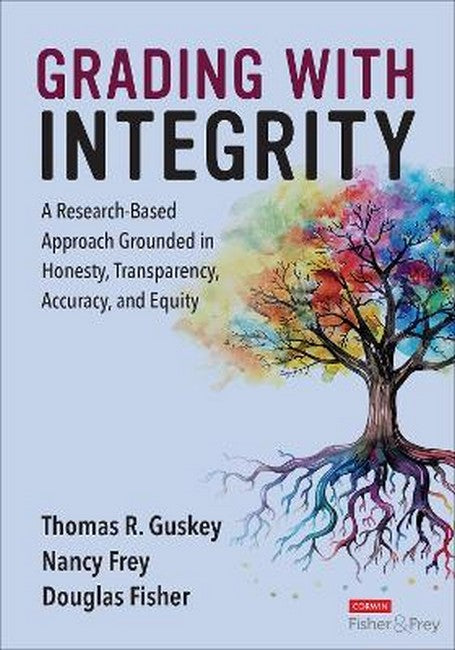Thomas R. Guskey, PhD, is Professor Emeritus in the College of Education at the University of Kentucky. A graduate of the University of Chicago's renowned Measurement, Evaluation, and Statistical Analysis (MESA) program, he began his career in education as a middle school teacher, served as an administrator in the Chicago Public Schools, and was the first Director of the Center for the Improvement of Teaching and Learning, a national educational research center. He is the author/editor of twenty-seven books and over three hundred articles published in prominent research journals as well as Educational Leadership, Kappan, and The School Administrator. Dr. Guskey served on the Policy Research Team of the National Commission on Teaching and America's Future, and on the task force to develop the National Standards for Professional Development. He was named a Fellow in the American Educational Research Association and was awarded the Association's prestigious Relating Research to Practice Award. He was also awarded Learning Forward's Outstanding Contribution to the Field Award and Phi Delta Kappan's Distinguished Educator Award. Perhaps most unique, in the 158-year history of his undergraduate institution, Thiel College, he is one of only three graduates to receive the Outstanding Alumnus Award and be inducted into the Thiel College Athletic Hall of Fame. His most recent books include Implementing Mastery Learning (2023), Instructional Feedback: The Power, the Promise, the Practice (with Smith & Lipnevich, 2023); Get Set, Go! Creating Successful Grading and Reporting Systems (2020), What We Know About Grading (with Brookhart, 2019), and On Your Mark: Challenging the Conventions of Grading and Reporting (2015). He may be contacted by email at guskey@uky.edu, Twitter at @tguskey, or at www.tguskey.com. Nancy Frey is professor of educational leadership at San Diego State University and a leader at Health Sciences High and Middle College. Previously, Nancy was a teacher, academic coach, and central office resource coordinator in Florida. She is a credentialed special educator, reading specialist, and administrator in California. She is a member of the International Literacy Association's Literacy Research Panel. She has published widely on literacy, quality instruction, and assessment, as well as books such as The Artificial Intelligences Playbook, How Scaffolding Works, How Teams Work, and The Vocabulary Playbook. Douglas Fisher is professor and chair of educational leadership at San Diego State University and a leader at Health Sciences High and Middle College. Previously, Doug was an early intervention teacher and elementary school educator. He is a credentialed teacher and leader in California. In 2022, he was inducted into the Reading Hall of Fame by the Literacy Research Association. He has published widely on literacy, quality instruction, and assessment, as well as books such as Welcome to Teaching, PLC+, Teaching Students to Drive their Learning, and Student Assessment: Better Evidence, Better Decisions, Better Learning.
Request Academic Copy
Please copy the ISBN for submitting review copy form
Description
Chapter 1: Why Grading for Integrity? Chapter 2: A Brief History of Grading: How Did We Get Here? Chapter 3: Asking Why: What Is Our Purpose for Grading? Chapter 4: Current Grading Schemas: What Are the Existing Problems? Chapter 5: Product: What is Standards-Based or Competency-Based Grading? Chapter 6: Process: How Do We Include Nonacademic Learning Goals in Grading? Chapter 8: Grading with Integrity: How Do We Get There?
I recommend this book, one hundred percent. The timing of this text couldn't be more perfect. As educators, we need to start and plan with the end in mind and continue to push our students in the best way possible. This book starts the conversations that allows our students to grow in the right directions. -- Darius Phelps Grading With Integrity sets the foundation for examining current grading practices by providing historical context, setting a purpose, and delving into our grading schemas. Incorporating real-life examples of challenges and purposes, the book addresses multiple facets within the complexity of grading based on the most current research. Practical strategies and tools for assessment and grading are intertwined throughout each chapter, equipping educators with the necessary resources to implement fair and effective grading practices in their classrooms. -- Alisa Barrett Grades are a huge component of our education system and students' understanding of "self" while in school. Yet we don't spend enough time discussing the best practices of communicating grades and scoring student work in ways that are meaningful to the necessary stakeholders, students, teachers, and families. I believe that Grading with Integrity will provide much-needed guidance to teachers and school leaders with varying levels of expertise and experience. -- Melissa J. Black I have the highest degree of confidence in the authors of Grading with Integrity as researchers and practitioners. Grading With Integrity provides the important research over the past century on a variety of grading practices but most importantly, the key research on best practices for creating a system for grading for equity! Not only do the authors do the arduous work of synthesizing and presenting key research, they also provide many practical examples and advice for implementation. What a combination! -- Dr. Angela Lyon Hinton

